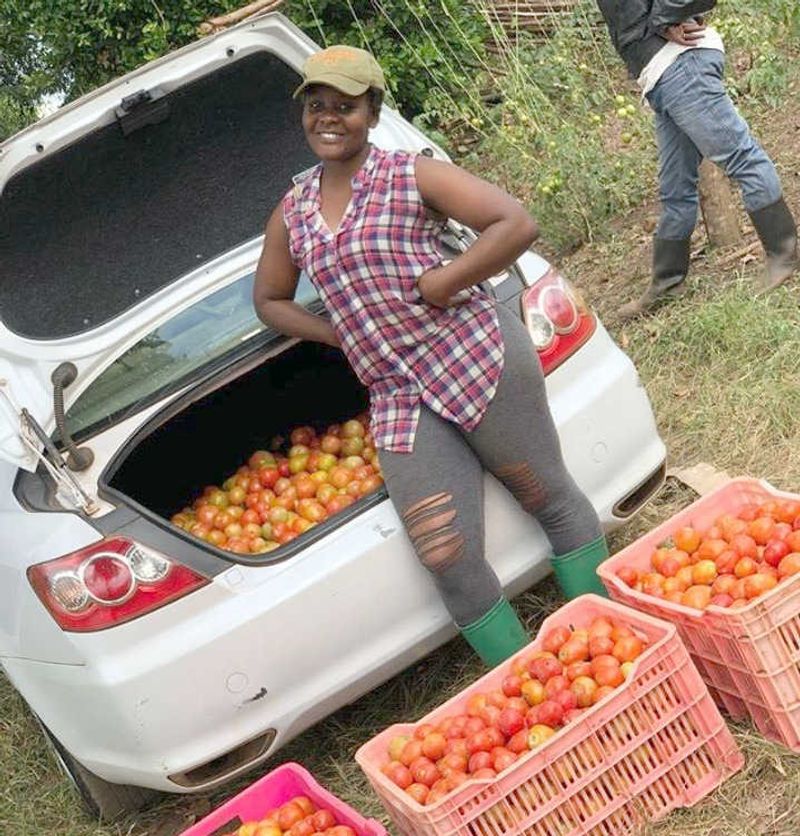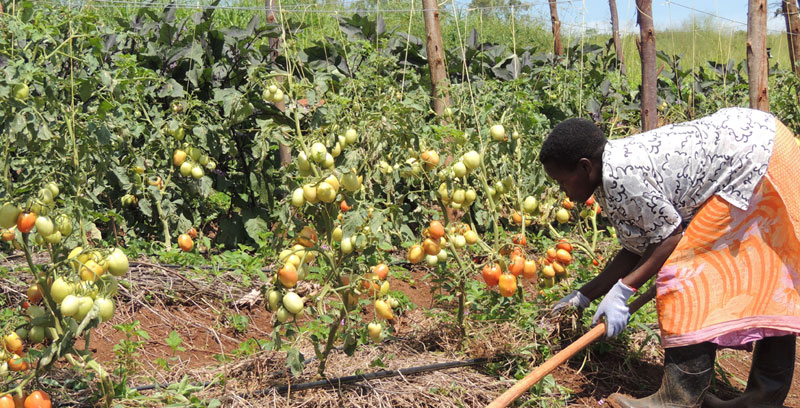

Is it time for Ugandans to think outside of the farm, as a way to end the over-reliance on the sector. Like this peasant farmer at Kampiringisa demonstration farm, many are investing into the sector
Uganda is currently experiencing probably its worst food glut in many years, thanks to good rains coupled with trade limitations brought about by the COVID-19 pandemic.
There is so much food in most parts of the country to the extent that farmers are not able to recover the costs of transporting it to nearby markets, let alone being able to cover the costs of production.
The crisis of plenty is affecting not just banana farmers, but also producers of tomatoes, pineapples, oranges, cassava, sweet potatoes and very soon maize as the harvest season for the crop nears.
The situation has been made worse by the entry into the industry of the so-called slay farmers, who are relatively well-paid people working in government, NGOs and the private sector who’ve taken to farming as a side job.
A number of traders and observers attribute the glut to the lock-down effects that dried the customer bases of fresh food sellers around Kampala and Wakiso urban areas.
In the face of the price crash, the farmers, more so the young people, are being advised to rethink their options and consider venturing into manufacturing.
As our columnist Ramathan Ggoobi has often remarked recently, it is fashionable these days to introduce oneself as a farmer.
He observes that many elites including high-ranking public servants have all invested big sums of money in primary agriculture, and often in the same peasant forms such as banana and coffee plantations that their parents used to educate them with.
Ggoobi argues that the country desperately needs to have a mindset shift that is championed by its leaders including from government as well as the private sector, that directs people away from primary agriculture towards manufacturing.
“Keith Muhakanizi, the Secretary to the treasury and arguably the highest-ranking person in the country in terms of economic policy is supplying NAADS with seedlings. His junior Kenneth Mugambe, the Director of Budget and Planning invested into cattle and bananas. Bank of Uganda Governor Tumusiime Mutebile, has established one of the largest tea farm in Kigezi region and their boss President Museveni is proudly painting a rosy picture of agriculture as the real sector, even with suffering among farmers that we’re witnessing” Ggoobi laments.
Ggoobi says that Ugandans need re-direct some of the capital away from land and agriculture towards manufacturing as the sector creates more durable products for a wider market than agricultural goods and better paying jobs.
Capital markets to the rescue?
In order to achieve the needed mindset shift, Ggoobi calls for new thinking in government economic departments that champions capital markets development as alternative investment vehicles.
But for capital markets to function efficiently, he notes, there is need to nurture the culture of good cooperate governance which is the pillar of trust that people rely on to invest in companies.
“People do not trust their money with other people because of the absence of a culture of good cooperate governance,” he notes.
Because developing vibrant capital markets in Uganda will probably take some time, they are not seen as a solution for the hurting farmers, which is why some people are calling for tried and tested solutions that have proved successful in other countries.
The idea of having state-owned storage facilities in the country has often cropped up but has been left hanging, perhaps due to lack of political will.
Many countries have some form of food storage mechanisms. Kenya for example maintains vast food reserves under the National Cereals and Produce Board. The board manages the countries Strategic Grain Reserves where excess produce is bought from farmers and stored for the bad day. The board is also responsible for the importation and distribution of farm inputs which are made available to farmers at subsidised prices.
Other countries such as the United States and many in Europe use agricultural subsidies or pay the insurance costs of farmers to cushion them against such challenges as very low prices of produce or loss arising from natural disasters like prolonged droughts and fires.
Cooperate to have a voice

Contrary to the view that Young people should venture into agriculture, a growing number of people think the country would benefit more if they ventured into manufacturing
Farmers in Kenya and the United States perhaps have what Ugandans don’t have. Powerful lobbying groups that amplify the voices and protect the interests of farmers, according Peter Wamboga-Mugirya, the Director of Communications at the Science Foundation for Livelihoods and Development (SCIFODE).
“We are currently witnessing the power of lobbying by Kenyan cane farmers who have blocked hundreds of trucks loaded with raw sugarcane that were destined for Kenya sugar mills. Kenyan farmers forced their government to block Ugandan sugarcane from crossing into Kenya because it threatened to undermine their market,” says Wamboga.
Indeed the powerful Kenyan farmers lobby has in the recent past blocked the importation of Ugandan milk and eggs citing very low prices that threatened to drive them out of business.
But because Ugandan farmers lack a serious body that unites them to make their voices heard, they suffer individually, Wamboga observes.
He says: “Until Ugandan farmers realise the power of cooperatives and speaking with one voice, they will continue to suffer.”
Elusive storage facilities
During last year’s bumper maize harvest that led to a crash in maize prices, the government promised to revive the national food silos. Since prices recovered, it seems that technocrats in the ministry of agriculture kept the minutes of the discussions on the shelves, until perhaps the next time public anger rises that they will retrieve them.
In a phone interview with The Sunrise, Minister of Agriculture Vincent Bamulangaki Ssempijja, said his ministry has identified groups of farmers in 80 districts in the country, with primary objective of improving food handling.
“Our primary focus is to improve food safety by sensitizing farmers not to dry food on the ground,”
When asked on the plans to revive national food silos, Ssempijja sounded ambiguous on the promise, stating that their plan is build the capacity of cooperatives within the communities to increase food storage, but that they don’t have the money to implement the plans.
But when Minister Ssempijja suddenly changed his tone and demanded that farmers are entirely accountable for the outcomes of their farms, suggests the government is not about to take this matter as urgently as some would have preferred.
“ Farming is a business. Those who venture into it, must know they have what it takes. If they say they want the government to provide everything, where will the money come from?” Ssempijja slammed.
The government’s failure to establish storage facilities despite recurrent boom and burst cycles, is eroding hopes among farmers that they can bank on the government’s promises of addressing the challenge of national food security with a lasting solution.
Although the Minister of Agriculture Vincent Bamulangaki Ssempijja repeatedly tells farmers to invest in storage facilities, majority of them are smallholders and have no money to invest in expensive equipment such as driers to preserve their produce. They therefore need the government to take deliberate steps to invest into this sub-sector.
Wamboga argues that food storage is a critical subject that cannot be relegated to small scale farmers, most of whom have no capital.
“We need an independent body whose primary responsibility is to ensure food security. The Ministry of Agriculture is too burdened with other things that it cannot pay sufficient attention to storage,” argues Wamboga.
Others however argue that farmers need to change their mindset by diversifying their produce and stop relying on perishable products.
Others have advocated for the development of a value chain agricultural model. Under this model, farmers of a particular crop engage with key off-takers or buyers of a commodity to agree in advance on things like minimum quality standards of the produce, variety, quantity in exchange for a reserve price.
The African Development Bank working with the African Agricultural Technology Foundation (AATF) last year tried to mobilise stakeholders in the maize sub-sector to try to create what they called the maize compact with the view to developing the maize value chain.
Experts argued that if well developed, the maize market is huge and goes beyond just meeting the food security requirements but can also be used as an input for making beer, processed for pharmaceutical starch and several other uses.
But the experts noted that for this to happen, different stakeholders need to engage the buyers with the support of the government which can offer tax incentives, to guarantee a market.
In the end however, the fragmented plots and individualistic mindset among farmers, has emerged as the biggest challenge that is hampering their progress from poverty. Without a common voices, many challenges such lack of access to capital, securing markets locally and internationally, insurance and storage will remain a pipe dream.














Henry Lutaaya
Leave a Comment
Your email address will not be published.